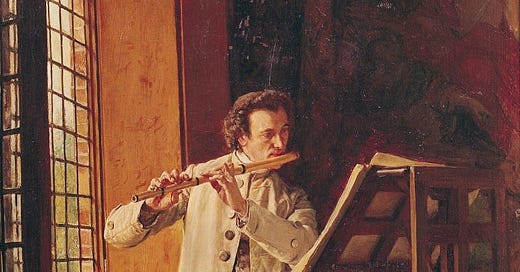On Practice
It has been one month since my last concert, and thanks to a particularly hectic holiday season, my air and fingers have become a little rusty. The slow process of getting back in shape always makes me anxious: like many musicians, I resemble the centipede in the nursery rhyme who, when asked by the toad which leg moved after which, became overwhelmed by thought and forgot how to walk. Thankfully, I do not have time to wallow in the deepities of musical physiology, for I have another concert to prepare—fear is an evil that grows in darkness, and it would overtake me but for this damn gig.
I do miss the control I had over my flute during the last concert, but I tell myself that it will return, and more importantly, while control is necessary on stage, the demands of performance exist outside of the pleasures of music-making. To understand music is not merely to control it, and if daily practice can be said to have a purpose greater than woodshedding, it is to understand not only music, but oneself.
So the Greeks said that Orpheus played the lyre with such sympathy that wild beasts were tamed by the hand on the strings. They did not suggest that he got this gift by setting out to be a lion tamer.
— J. Bronowski, Science and Human Values
For the true master, music is a way to learn how to die. It is with them through all of life’s cycles—it flows through them, and when it is time, flies away. When we feel our spines tingling in the presence of a great musician, perhaps it is their understanding and acceptance of the impermanence of all things that we are perceiving through their music. However, to echo Montaigne, such mastery cannot be fully appraised until the final moment, for it is only then that all pretenses fall away and we see what they have at the bottom of the pot, be it clean or foul, water or wine.




